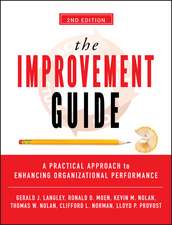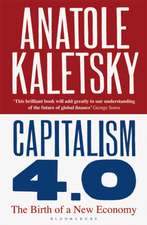The Concept of Capitalism
Autor Bruce R. Scotten Limba Engleză Paperback – 21 iul 2009
Preț: 139.77 lei
Nou
Puncte Express: 210
Preț estimativ în valută:
26.75€ • 29.04$ • 22.47£
26.75€ • 29.04$ • 22.47£
Carte disponibilă
Livrare economică 02-16 aprilie
Preluare comenzi: 021 569.72.76
Specificații
ISBN-13: 9783642031090
ISBN-10: 3642031099
Pagini: 84
Ilustrații: VIII, 76 p. 5 illus.
Dimensiuni: 155 x 235 x 10 mm
Greutate: 0.15 kg
Ediția:2009
Editura: Springer Berlin, Heidelberg
Colecția Springer
Locul publicării:Berlin, Heidelberg, Germany
ISBN-10: 3642031099
Pagini: 84
Ilustrații: VIII, 76 p. 5 illus.
Dimensiuni: 155 x 235 x 10 mm
Greutate: 0.15 kg
Ediția:2009
Editura: Springer Berlin, Heidelberg
Colecția Springer
Locul publicării:Berlin, Heidelberg, Germany
Public țintă
Popular/generalDescriere
his monograph on the concept of capitalism is the intellectual core of a larger work, entitled Capitalism, Its Origins and Evolution as Ta System of Governance, due for publication November 2009. The purpose of this monograph is to put forth an original concept of ca- talism as a system of governance, including a theory of how it functions at any point in time and how it evolves through time. In the larger book, I present a theory of its origins and evolution and support this theory with a set of country case studies that span both time and geography. It was, in fact, my experience in studying these case studies that led me to the c- cept presented here as well as to the theory of capitalism’s origins and e- lution. In the larger book, I build on the present work, identifying and expla- ing capitalism as a system of governance for political entities such as - tion states. I then supplement these ideas with a description and expla- tion of three generic economic strategies. Taken together, my studies of economic strategies and specific capitalist systems of governance are - tended to enhance and enrich existing literature on “varieties of capit- ism”.
Cuprins
Historical Conceptions of Capitalism.- Some Current Conceptions of Capitalism: Discussion and Critique.- My Conception of Capitalism.- Political Authority Shapes Capitalism with Visible Human Agency.- The Political and Economic Systems are Interdependent.- Conclusions.
Recenzii
"An excellent case for thinking of capitalism as a system embodying political authority as well as markets and, after reading it, one wonders how one could ever have thought otherwise" Prof. Peter A. Hall, Harvard University
"Scott’s analysis of capitalism and democracy is striking both for its originality and for its rich policy suggestiveness and sheds an entirely new light on recent economic history" Charles Morris, author of "The Trillion Dollar Meltdown"
"Scott’s analysis of capitalism and democracy is striking both for its originality and for its rich policy suggestiveness and sheds an entirely new light on recent economic history" Charles Morris, author of "The Trillion Dollar Meltdown"
Textul de pe ultima copertă
A single system of economic governance – capitalism – prevails in the world today, both in theory and in practice. Yet there is neither a standard definition of capitalism nor a theory of how it works. Moreover, the most common conception of capitalism is that of a one-level system governed by markets, i.e., supply and demand, where many socioeconomic externalities are ignored. The purpose of this book is to counter this conception, showing that capitalism is more than markets. In fact, capitalism shares many parallels with everyday organized sports, in that both are indirect, three-level systems of governance where "freedom" is conditional on "playing by the rules." In organized sports, games (level 1) are shaped by official rules and monitored by referees (level 2), which are in turn regulated and revised by a governing organization (level 3) that oversees the sport as a whole. In capitalism, markets (level 1) are shaped by institutions and regulations and monitored by independent officials (level 2), which are in turn selected and shaped by a political authority (level 3) that oversees the system as a whole.
As simple and obvious as this parallel with organized sports may seem, the underlying cause of much of the economic instability of the last 25 years, and specifically of the current crisis, has stemmed from not understanding capitalism in this way, i.e., as a three-level system of governance. Only by improving our understanding of capitalism can we create better institutions and implement better policymaking to not only fix the present crisis of our capitalist system but also avoid future ones.
"Scott’s analysis of capitalism and democracy is striking both for its originality and for its rich policy suggestiveness and sheds an entirely new light on recent economic history" Charles Morris, author of "The Trillion Dollar Meltdown"
"An excellent case for thinking of capitalism as a system embodying political authority as well as markets and, after reading it, one wonders how one could ever have thought otherwise" Prof. Peter A. Hall, Harvard University
As simple and obvious as this parallel with organized sports may seem, the underlying cause of much of the economic instability of the last 25 years, and specifically of the current crisis, has stemmed from not understanding capitalism in this way, i.e., as a three-level system of governance. Only by improving our understanding of capitalism can we create better institutions and implement better policymaking to not only fix the present crisis of our capitalist system but also avoid future ones.
"Scott’s analysis of capitalism and democracy is striking both for its originality and for its rich policy suggestiveness and sheds an entirely new light on recent economic history" Charles Morris, author of "The Trillion Dollar Meltdown"
"An excellent case for thinking of capitalism as a system embodying political authority as well as markets and, after reading it, one wonders how one could ever have thought otherwise" Prof. Peter A. Hall, Harvard University
Caracteristici
The author is the Paul Whiton Cherington Professor of Business Administration at Harvard Business School and has done extensive research and teaching in the field of economic strategies of nations
A very inventive, sharp-witted and thought-provoking analysis of the interrelation of capitalism, democracy and development, offering unequaled insight to the subject
Includes supplementary material: sn.pub/extras
A very inventive, sharp-witted and thought-provoking analysis of the interrelation of capitalism, democracy and development, offering unequaled insight to the subject
Includes supplementary material: sn.pub/extras













